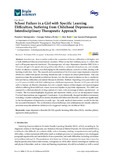| dc.contributor.author | Tatsiopoulou, Paraskevi | |
| dc.contributor.author | Porfyri, Georgia-Nektaria | |
| dc.contributor.author | Bonti, Eleni | |
| dc.contributor.author | Diakogiannis, Ioannis | |
| dc.date.accessioned | 2022-01-19T08:15:02Z | |
| dc.date.available | 2022-01-19T08:15:02Z | |
| dc.date.issued | 2020-12 | |
| dc.identifier.uri | http://hdl.handle.net/11728/12105 | |
| dc.description.abstract | Introduction: Recent studies confirm the association of literacy di culties with higher risk
of both childhood behavioral and mental disorders. When co-morbid problems occur, it is likely that
each will require separate treatment. The management of major depressive disorder (MDD) for a
9.5 years old girl with specific learning di culties (SLD), a protracted clinical course, and a family
history of a ective disorders, was challenging for the interdisciplinary team of our clinic, dealing with
learning disabilities. Aim: The research and examination of the first-onset major depressive disorder
(MDD) in a child with specific learning disabilities and its impact on school performance. This case
report examines the potential contributory factors, but also the recent evidence on the co-morbidity
between literacy di culties and mental illnesses in children. Method: Reporting a two years follow-up
of a 9.5 years old child with SLD su ering from childhood depression. Results: A 9.5 years old child
with no history of a ective disorders, but with a family history of first-degree and second-degree
relative su ering from childhood-onset, recurrent, bipolar or psychotic depression. The child was
assessed by a child psychiatrist during a period of 2 years, with an average of follow-ups between 1 or
2 weeks. The discussion highlights diagnostic and treatment pitfalls, as well as developmental issues.
Practical interventions are suggested. Conclusion: A psychiatrically charged familial environment,
including a mother su ering from anxiety disorder and behavioral disorder, contribute significantly
to the development of depression in early age. An early medical intervention would be the key
for successful treatment. The combination of psychotherapy and antidepressants (mostly selective
serotonin reuptake inhibitors (SSRIs)) is the suggested therapy for childhood MDD. | en_UK |
| dc.language.iso | en | en_UK |
| dc.relation.ispartofseries | Brain Sciences;vol.10, issue 12 | |
| dc.rights.uri | http://creativecommons.org/licenses/by-nc-nd/4.0/ | en_UK |
| dc.subject | major depressive disorder (MDD) | en_UK |
| dc.subject | specific learning difficulties (SLD) | en_UK |
| dc.subject | interdisciplinary approach | en_UK |
| dc.subject | child psychiatry | en_UK |
| dc.title | School Failure in a Girl with Specific Learning Di culties, Su ering from Childhood Depression: Interdisciplinary Therapeutic Approach | en_UK |
| dc.type | Article | en_UK |
| dc.doi | 10.3390/brainsci10120992 | en_UK |


